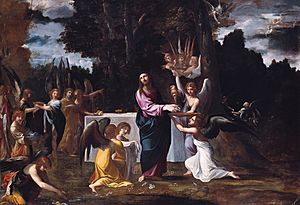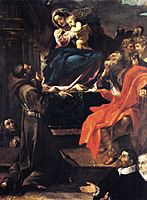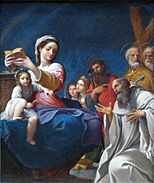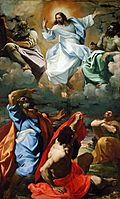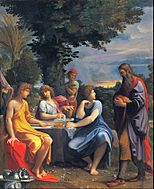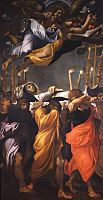Ludovico Carracci facts for kids
Quick facts for kids
Ludovico Carracci
|
|
|---|---|
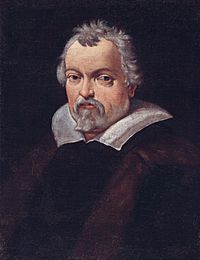 |
|
| Born | 21 April 1555 |
| Died | 13 November 1619 (aged 64) Bologna
|
| Education | Prospero Fontana |
| Known for | Painting |
| Movement | Baroque |
Ludovico Carracci (born April 21, 1555 – died November 13, 1619) was an important Italian painter. He was also an etcher and printmaker. Ludovico was born in Bologna, Italy. He helped start the early Baroque art style. His paintings often showed strong feelings. He used big movements and bright, flickering light. This helped create a spiritual mood in his art. He is known for bringing new life to Italian art, especially fresco painting. Fresco painting had become very formal before him. Ludovico Carracci died in Bologna in 1619.
Contents
Biography of Ludovico Carracci
Ludovico started his art training in Bologna with Prospero Fontana. He traveled to other cities like Florence, Parma, and Venice. After these trips, he returned to his hometown.
Ludovico worked with his cousins, Annibale Carracci and Agostino Carracci. They created large fresco paintings together in Bologna. These included the Histories of Jason and Medea (1584) at Palazzo Fava. They also painted the Histories of Romulus and Remus (1590-1592) for the Palazzo Magnani. It is hard to know exactly which parts each cousin painted. Annibale was younger than Ludovico but became very famous. This led to Annibale getting a big job in Rome. He painted the Loves of the Gods in the Palazzo Farnese. Agostino joined Annibale there for a short time.
The Carracci Studio
Ludovico stayed in Bologna. He was still very important to the art world. Around 1585, Ludovico and his cousins started a painting school. It was sometimes called the Accademia degli Incamminati. This name means "Academy of the Progressives." More recently, people think it was not a formal school. Instead, Ludovico likely taught many students in his art studio.
This studio helped many artists from the Emilia region become famous. They went on to work in Rome and other places. It also helped create the Bolognese School of painting. This was an important art movement in the late 1500s. Famous artists like Albani, Guercino, Reni, and Domenichino were part of this school. The Carracci cousins taught their students to draw from real life. They focused on observing nature and drawing people in natural poses. They also encouraged bold, large-scale drawings of figures. Two of Ludovico's main students were Giacomo Cavedone and Francesco Camullo.
Restitution of Artworks
In 2009, one of Carracci's paintings, St. Jerome (painted around 1595), was returned. It was given back to the family of Dr. Max Stern. He was a German Jewish art dealer. His art was taken from him during the Nazi era.
Images for kids
- Ludovico Carracci's works
-
Madonna and Child with St Francis of Assisi (1591) – known as "La Carraccina" due to the admiration of the young Guercino
See also
 In Spanish: Ludovico Carracci para niños
In Spanish: Ludovico Carracci para niños
 | Sharif Bey |
 | Hale Woodruff |
 | Richmond Barthé |
 | Purvis Young |


